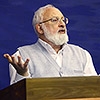Audio Version Of The Blog – 12/19/23
Listen to an Audio Version of the Blog
Download:MP3 Audio

Listen to an Audio Version of the Blog
Download:MP3 Audio

Michael Laitman on the Times of Israel: “Would Life Be Better without Disagreements?”
It might seem as if life would be better without disagreements because then we would have no wars and conflicts, but it is far from the case. Without disagreements, our lives would be unilateral, one-sided and humanity would be unable to develop.
In his article, “The Freedom,” Kabbalist Yehuda Ashlag (Baal HaSulam) writes about how humanity advances through disagreements:
“We must be watchful to not bring the views of people so close that disagreement and criticism might be terminated from among the wise and scholarly, for the love of the body naturally brings with it proximity of views. And should criticism and disagreement vanish, all progress in concepts and ideas will cease, too, and the source of knowledge in the world will dry out.”
However, the need for disagreements does not necessitate war. We can settle disputes with other methods, without engaging in physical conflicts.
We end up in wars because we have yet to develop to a level where we can resolve our disputes and disagreements maturely. The way we currently resort to wars makes us look like little children.
Disagreements can serve to develop us positively if we reach decisions on them through civil discourse.
Criticism of the other’s perspective is a key aspect of a disagreement, and it is crucial for humanity’s development, as Baal HaSulam writes about in the same article. Without criticism, we would not be able to develop.
“The more contradictions there are between opinions and the more criticism there is, the more the knowledge and wisdom increase and matters become more suitable for examination and clarification.”
It is difficult for us to accept criticism because our egoistic makeup, which makes us want to view ourselves as superior to others, does not want to be criticized. But we would be very unwise to resist criticism. When we understand that the more criticism, opinions and disagreements there are, the more we can discover who, where, how and why nature formed us in such a contradictory form to itself, then the more we can reveal the truth about ourselves and our lives. In other words, through disagreements and criticism, we should aspire to truth, and we learn the truth by navigating through the intricate web of contradictory states and views.
However, since our egos cannot stand criticism, we often fail to use it constructively. We can see many examples of one side applying pressure to others until they cave in, and if they continue disagreeing, then they erupt in war. That is largely how our world unfolds. Our egos prevail over many opportunities to discuss and grow.
Criticism is constructive and positive when it leads to a mutual discussion, and ultimately, an agreement. On the contrary, when it leads to detachment, even to the point of war and destruction, then of course, it is harmful and destructive.
We see that at the end of wars, we in any case reach conclusions that we need to sit and discuss matters. War gives a certain kind of awareness of the evils of our egoistic nature, but it is nonetheless undesirable to reach such lengths of destruction and suffering in order to finally settle matters in a civilized manner. We thus need disagreements and criticism in order to progress, and we should not have to reach wars and destruction in order to awaken ourselves to progress through our own discussions and scrutinies.
If we lived in a world filled with goodness and love, we would still need criticism? Of course we would. There would be discussions and a certain common denominator reached at a level of a mutual love for one another, which would continually advance humanity among a massive number of opinions and contradictions. It is written about such a state that “love will cover all transgressions.”
[322276]
 Question: What is the difference between bestowing for the sake of bestowing and receiving for the sake of bestowing?
Question: What is the difference between bestowing for the sake of bestowing and receiving for the sake of bestowing?
Answer: Bestowing for the sake of bestowing is the level of Bina, and receiving for the sake of bestowing is the level of Hochma. There is a very big difference between them.
Question: Can it always be Hanukkah when you hope for the Creator’s help?
Answer: Yes, in this case you are in the state called Hanukkah.
Question: When a person finally comes to the realization that if the Creator does not help him, he is lost, is this a state of victory over the Greeks?
Answer: This is a very good state for a person because now he knows for sure that he needs the Creator.
Question: Is it possible, based on the realization that “there is none else besides Him” and faith above reason, to accept a peace agreement with egoism, and not break it, but to move further together with it along a path that would suit both?
Answer: No, it is impossible. Until you break it, nothing will happen. You must defeat egoism—each one within himself and all together in the whole world. Otherwise we are finished.
Question: We say that on Hanukkah a person has already overcome his evil inclination, the Din (judgment) has stopped, and he can work for bestowal. Why can we not just wait for the light of Shabbat to come, but we need to continue the fight?
Answer: The lights do not come automatically, but only after your struggle and your victory.
[322152]
From the Daily Kabbalah Lesson 12/13/23, Writings of Rabash “Greeks Have Gathered Around Me”
Related Material:
Questions about Spiritual Work—45
Questions about Spiritual Work—44
Questions about Spiritual Work—43
 “Greeks” are a person’s egoistic properties that do not allow him to advance to the properties of the Creator—love and bestowal. At the same time, they help us by the fact that in their opposition, they force us to strengthen our movement toward the Creator, ask Him for help, and rise higher and higher.
“Greeks” are a person’s egoistic properties that do not allow him to advance to the properties of the Creator—love and bestowal. At the same time, they help us by the fact that in their opposition, they force us to strengthen our movement toward the Creator, ask Him for help, and rise higher and higher.
Question: But what if the “Greeks” come from the group? Still, it is unclear whether to ask a friend to correct this desire or to raise it?
Answer: And what if the Greeks come from you? What do you do? There are egotistic desires in each of us.
They are called Greeks without any connection with that nation. Therefore, it is necessary to separate the properties of bestowal and love from the egoistic properties that have been called the Greeks for several thousand years.
Question: Is there any kind of a universal answer to all the smart questions of the Greeks so as not to fall into this abyss together with them every time?
Answer: Yes, there is one universal answer, it is the connection between us when, as a result of our spiritual work, we attain one single force of bestowal, fight with the Greeks, and win.
Question: What happens to the Greeks afterward? Do we destroy them, or do they turn into some kind of force?
Answer: We do not destroy anyone. In our wars, we only change our intentions from receiving for ourselves to bestowing to the Creator.
[322167]
From the Daily Kabbalah Lesson 12/13/23, Writings of Rabash “Greeks Have Gathered Around Me”
Related Material:
Hanukkah – The Miracle Of Unity
The Maccabean Wars
The Contemporary Maccabean War With Global Egoism
 Question: How can we be honored with the hidden part of the Torah? What should be the main task in spiritual work?
Question: How can we be honored with the hidden part of the Torah? What should be the main task in spiritual work?
Answer: We should attempt to unite between us until we feel a connection with each other. This connection is our common desire, directed toward the Creator.
We try to feel our striving for the Creator in it and try to give Him this common desire in which He could manifest Himself as a desire to bestow. It is called soul.
Question: If we can only act in the revealed part of the Torah for now, how can we get closer to performing the right actions if many people are confused about that part?
Answer: It is simple. If I want to open my heart and soul to my friends, I am ready to be with them in one desire, in one movement toward each other, to unite, to merge. That is my work.
[321859]
From the Daily Kabbalah Lesson 12/6/23, Writings of Baal HaSulam “Concerning the Revealed and the Concealed“
Related Material:
What Is The Difference Between The Revealed And The Concealed Torah?
The Torah Begins From A Secret
The Book That Connects The Sky And The Earth
 Comment: Please comment on a verse by the ancient Persian poet Sa’adi. It is written in gold letters and adorns the pediment of the building of the UN headquarters in New York.
Comment: Please comment on a verse by the ancient Persian poet Sa’adi. It is written in gold letters and adorns the pediment of the building of the UN headquarters in New York.
Sa’adi writes:
All human beings are members of one frame,
Since all, at first, from the same essence came.
When time afflicts a limb with pain,
The other limbs cannot at rest remain.
If thou feel not for other’s misery,
A human being is no name for thee.
It feels like he was a Kabbalist too.
My Response: Did you and I together visit a Sufi in England?
Comment: He made a serious impression then. Do you mean that he is an Iranian Sufi after all?
My Response: Yes.
Question: “All human beings are members of one frame,” what does this mean?
Answer: One frame is one person.
Question: The entire world?
Answer: The entire world, yes.
Question: Is it all like the organs of one person?
Answer: The Creator created a man, one man, Adam. This is how it is in reality. What we see is our egoism that separates us.
Question: So, is it all, in fact, a lie? Is the truth that we are all connected?
Answer: Yes.
Question: Then he writes: “Since all, at first, from the same essence came.” What does this mean? What kind of essence is this?
Answer: All was created from one single egoism. This is the essence.
Comment: That is, our nature is definitely the egoism of everyone.
“When time afflicts a limb with pain, The other limbs cannot at rest remain.”
My Response: Yes. Even if one part of our body is affected by egoism, our whole body, the whole person, is sick. This is like a cancer cell.
Comment: In fact, now the whole body is really affected.
My Response: Now all of humanity is affected. But this is good.
Question: What is good about it?
Answer: The good thing is that this is very close to the complete recognition of egoism. That is, if we recognize that we are all affected by this, let’s say, cancerous tumor, then we will look for a cure for it.
Question: But, in fact, it is written that at least some small part. Does it mean that we are not talking about some kind of cure for one part? It does not seem to be possible.
Answer: No, no, we are talking about the cure of all of humanity.
Question: Does it mean that one part cannot be cured? Should this be the cure for all of humanity?
Answer: Yes.
Comment: Then he writes: “If thou feel not for other’s misery, A human being is no name for thee.”
My Response: Yes. If you do not feel the other’s misery, then you are not human.
Question: Do you perceive this directly?
Answer: Yes. People will see, recognize, and understand that you are like that.
Question: It does not look easy either. Today, the earth is covered with misery by and large.
Answer: Yes, but what is happening now is not the end! I can see by the “holy people,” as they say, how far they are from all this.
Question: But they should carry only one thing, by and large. This is why you call them the “holy people.” What should they carry?
Answer: That the Creator is one.
Question: Is this the message that we need to spread around the world?
Answer: Yes.
[321031]
From KabTV’s “News with Dr. Michael Laitman” 10/30/23
Related Material:
Man Is Someone Who Is Compassionate
Return To The Likeness Of An Adam
Becoming Adam
 For thousands of years nature has always been giving, but we have evolved as egoistic beings, constantly taking. And this is normal, as according to the program of nature, we were supposed to be like that and to develop egotistically.
For thousands of years nature has always been giving, but we have evolved as egoistic beings, constantly taking. And this is normal, as according to the program of nature, we were supposed to be like that and to develop egotistically.
It is like a growing child that you feed and give everything to, he develops egotistically, and you are pleased with that. And then he grows up, and suddenly you tell him: “That is it! Now go to work, pay for yourself, do everything for yourself, and take responsibility for yourself. And look, if you do something wrong, you will be punished.”
That is where we are today: we developed and developed like little children, and then we reached adulthood, the world has shrunk, become global, and integral, and it forces us to be adults. Being adults means being in the right connection with each other.
Just as an adult at the age of 20 to 25 begins to work, build himself, his home, and connect with the world as a doer, now humanity has similarly reached the age when it has become an adult.
We are being shown our place of work now. We must connect with each other and build a new society that is not like it was before.
Previously, we egoistically grew for thousands of years, and now we must connect with each other according to the law of mutual guarantee, mutual responsibility, and mutual concessions. You do not want to? You will receive blows from nature because you do not conform to it. This is where we are now; we are becoming adults.
I understand that we do not want this. Who does? When I am a child, there are no claims against me. When I misbehaved, broke something, or played around, I was treated like a child. But when I become an adult, it obligates me. But we do not realize this yet.
We are resistant to it and opposed to it; we want to play with some toys. I look at these supposedly strong, great, wise people of the world, and they are like children in a sandbox who do not want to crawl out of it even though they have already outgrown their age.
When you tell them this, they get offended and think you are an unrealistic person: “Look at this world! You can play in it as much as you want: stock market, money, cars, wine, movies! And what are you suggesting here? That is not what we want at all! Be responsible for something—why do we need that? We have enough small toys around us and need nothing more.”
This is a big problem. But still, we will have to get out of the sandbox.
[321428]
From KabTV’s “I got a call. Reasons for Cancer and AIDS” 10/29/11
Related Material:
Two Ways of Development of Humanity
It Is Time for People to Open Their Eyes
Two Ways Toward The Same Goal
 Question: The article “The Night of the Bride” talks about King David committing adultery with the wife of his military commander, Uriah. Why exactly did King David, a righteous man, perform such an act?
Question: The article “The Night of the Bride” talks about King David committing adultery with the wife of his military commander, Uriah. Why exactly did King David, a righteous man, perform such an act?
Answer: King David was truly an absolutely righteous man in everything. What is described in the Torah is interpreted by us from a corporeal point of view.
During the reign of King David, his friend Uriah, who led the regiment, was forced to go to war. After this, David began a relationship with his wife and thereby greatly harmed himself and others.
Many questions arise here. First, you cannot get involved with a married woman especially if you sent her husband to war.
It is further explained that, in fact, she was no longer Uriah’s wife because those who went off to war got divorced beforehand so that if they died, the divorced wives could remarry.
Question: What does “thou shalt not commit adultery” mean in spiritual work?
Answer: Those are very difficult things when a person is left alone with his thoughts, feelings, and decisions.
From a spiritual point of view, a man’s wife is his will to receive, i.e., his intention for his own sake. The prohibition of having a relationship with the wife of another means that you cannot use the desire of your neighbor for your own sake.
[321413]
From KabTV’s “Introduction to The Book of Zohar” 11/12/23
Related Material:
Adultery In Spirituality
The Commandment: “Thou Shalt Not Commit Adultery”
The Commandment: “Thou Shalt Not Steal”
 Question: The spies and the 70 nations of the world are opposed to the spiritual path in different ways. The nations of the world do not want to go in this direction at all. What about the spies?
Question: The spies and the 70 nations of the world are opposed to the spiritual path in different ways. The nations of the world do not want to go in this direction at all. What about the spies?
Answer: The spies seem to want to, but they are afraid, dissuade others, and use all sorts of techniques in order to lead them off the right path.
Question: How can the spies try to lead me away from the goal? Are they foreign thoughts or intentions for my own sake?
Answer: They are not entirely foreign thoughts. Spies use your interest in the spiritual path and try to fit it into actions that lead you away from the goal: “You want to go toward this goal, but go to a different one, and there you will find what you want.”
A person must discover this in himself. It is not that easy to do, but it is not hard either.
[321756]
From the 1st part of the Daily Kabbalah lesson 12/4/23, Writings of Rabash “The Spies“
Related Material:
Obeying The Creator Unquestionably
Work Not For The Sake Of Reward
True Love Is The Fulfillment Of Another’s Desire
 The root of all the sins is the will to receive in order to receive, which is what a person receives from the Creator, meaning from His domain, and lets everything into his own domain, which is called “theft.” That is, he extracts from the domain of the Creator, and he takes the pleasures from the Creator’s domain into his own. It follows that he is not regarded as a thief but as a robber, for although the Creator sees him taking, his will to receive is so strong that he cannot resist it, which is why he is considered a robber and not a thief (Rabash. Article No. 20, 1986. Should One Sin and Be Guilty).
The root of all the sins is the will to receive in order to receive, which is what a person receives from the Creator, meaning from His domain, and lets everything into his own domain, which is called “theft.” That is, he extracts from the domain of the Creator, and he takes the pleasures from the Creator’s domain into his own. It follows that he is not regarded as a thief but as a robber, for although the Creator sees him taking, his will to receive is so strong that he cannot resist it, which is why he is considered a robber and not a thief (Rabash. Article No. 20, 1986. Should One Sin and Be Guilty).
Question: How can we resist a thief and a robber? What is the difference?
Answer: We can only catch the thief and take from him what was stolen. How does one do this? We still have to learn this.
However, we have to catch the robber in order to take the loot from him, scare him, and fight with him because he wants to take everything. He already has a clearer understanding of what we are taking from him or what he has stolen from us.
Question: What helps in the war with myself when I realize that I am a robber?
Answer: Only connection with the friends; there is nothing else. From there, you will receive an answer for any state.
[321659]
From the Daily Kabbalah lesson 11/30/23, Writings of Rabash “Should One Sin and Be Guilty“
Related Material:
The Connection Of Big Egoists
Direct Degree To The Creator
How Can We Please The Creator?